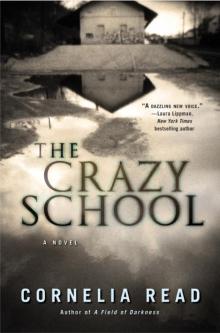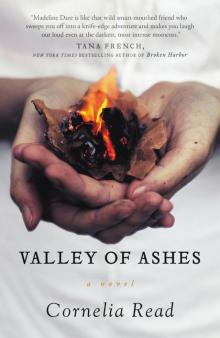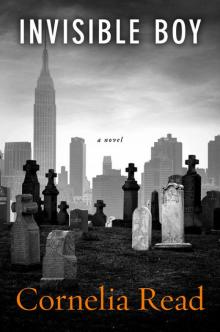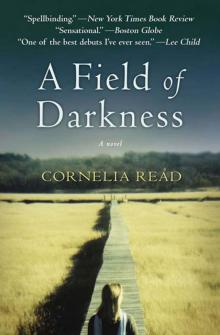- Home
- Cornelia Read
Invisible Boy Page 10
Invisible Boy Read online
Page 10
She was up front behind the wheel, Pierce riding shotgun beside her.
We were parked in someone’s driveway, picking Pagan up after a friend’s slumber party.
The three of us watched a dozen ten-year-old girls stumble out of the house one by one, clutching rolled-up pastel sleeping bags and little pink or purple overnight cases.
And as each downy-armed, bare-legged child walked past us to climb into a parent’s car, Pierce pronounced judgment, in his plummy community-theater drawl, on whether or not she was a nymphette.
I just kept seeing that afternoon in my head while Pagan spoke on the sofa, next to me in the present.
She told me about the time he’d French-kissed her when she was eleven, the time he’d pressed his hard-on against her leg and asked her if she liked the way a real man felt.
I asked her if she’d told Mom about that, or about the time we got left with him for a long weekend, when Pagan said she’d fallen asleep in their bed after we’d all been watching TV together, and Pierce woke her up by sticking his hands between her legs.
“I told her all of it,” she said, taking another sip of beer.
“What the hell did she say?”
“It was a pretty bizarre conversation, actually.”
“Like how?”
“Well, she started out being all Mama-Bear protective, but only right at first, then it felt like she was tuning in and out, changing her mind.”
“Changing her mind about what?”
“About whether what I told her had actually happened,” said Pagan.
“Wait a minute. Mom thought you made this up?”
“It was a long conversation.”
“I don’t care how fucking long it was—that’s completely insane. I mean, your kid comes to you and tells you something this awful… Jesus.”
“I don’t mean she accused me of lying, more like I had to keep trying to convince her, and the longer we talked, the more she didn’t believe me. Or maybe didn’t want to believe me? It got… slippery. She was sliding away from it, in her head. From me. By the end of the conversation I felt like she was completely gone, and I still wanted to pin her down, make her say ‘Yes, I understand that this really happened, and it was wrong and I’m angry enough to do something about it.’”
“Did she?” I asked.
“No.”
“So what happened? How did it end?”
“She got pissed at me, asked why I had to be such a drag and concentrate on the negative stuff, and then she wouldn’t talk about it anymore.”
I gripped my empty beer bottle tighter, wanting to throw it across the room. Or at our mother. “When was this?”
“A few years ago,” she said. “I was in college.”
“Have you guys talked about it since?”
“I’ve tried a couple of times, but it seems pointless. Besides being painful. The fact that she’s so squirrelly about it is horrible.”
“Squirrelly how?” I asked.
“Like, she’s actively choosing not to believe it, but won’t say ‘You’re lying’ to my face, because then I could call her on it.”
“And she still hangs out with him,” I said. “Every time she goes back to California.”
“Right. And then she’s gotta tell me about it, you know? All bubbly about how much fun it was, having dinner with Pierce and his new wife or whatever, and expecting me to be chipper and shit. I mean, this is like—if somebody had stabbed me, would she still be going to parties with him?”
I scooted my feet over to her, pressing my toes against her hip.
I’d spent vast amounts of time and energy despising Pierce Capwell, never once realizing how tremendously fortunate I was that he’d loathed me from the moment we met.
“Pagan, I am so goddamn sorry,” I said, my anger on her behalf so fierce that I burst into tears.
20
We hugged each other good night around one, and I lay in bed for hours wondering whether I owned anything worth pawning for a plane ticket west so I could bludgeon Pierce into a flat bloody slick of pulp with the rounded end of a ball-peen hammer.
I remembered him needling Mom about how spoiled we were until he’d coerced her into giving us more household chores. In any other household that would have in and of itself been perfectly fair.
It was the way he gloated about it, sitting on at the kitchen table every night during my week to do the dishes, long after everyone else had left to go watch TV, for instance. He’d take a seat out of my direct line of sight, drawling on and on about “what a tiger your mother is in bed,” then have the gall to complain when I rushed through the task, neglecting to clean bits of food out of the strainer in the bottom of the sink.
He’d fish the slimy dregs out with his fingers, calling Mom back into the room so he could shove them in her face to underscore my brazen disrespect for the moral worth of a job well done.
But as vain and cruel and depraved as he’d been—with his ridiculous pompadour and his skinny legs and his too-carefully-kept Vandyke beard—we kids were still better off than Teddy Underhill.
Pierce had splashed me with constant vitriol, he had molested my sister, but he hadn’t killed us.
I thought of Teddy’s shattered bones, and I knew that in the greater scheme of things my siblings and I could count ourselves lucky.
Our mother had chosen a lover who was merely vicious, repellent, and morally bankrupt. She hadn’t trusted our welfare to a man who wanted us dead.
It took every ounce of moral fiber in my being to drag my ass out of bed the following morning. Dean had already sprinted uptown to meet Christoph. I was still on the early shift at the Catalog, which meant I was supposed to be in midtown by seven-fifteen. Sue had another hour to sleep in, and Pagan more than that because she wasn’t on the work roster that day.
The inhumanity of the hour struck me as supremely sucky vindictiveness on the part of the entire universe. I tossed back pint-the-second of my signature “light sweet crude” Café Bustelo following a blistering shower that had done nothing to resurrect so much as a shred of my mental acuity.
I slapped on my Walkman headphones and cued up some Mozart, hoping to quell the sour burn of unrequited rage in my belly. Maybe if Astrid didn’t go to Rome she could spot me a ticket to California. I wouldn’t need any luggage, just a nice fat Louisville Slugger as a carry-on.
I was not now nor had I ever been a morning person, but I was even more grateful than usual that Manhattan so rarely called upon me to endure extemporaneous gouts of A.M. chirpiness from my fellow commuters. Had any cheerful misguided tourists offered me so much as a flicker of cornfed-Rotarian eye contact on the Fourteenth Street uptown 4-5-6 platform that morning, I would’ve gripped them firmly by the necks of their EVITA/CATS/MISS SAIGON sweatshirts and body-slammed them headfirst onto the third rail, then pissed on their respective pointy green souvenir-foam-rubber-Statue-of-Liberty halos to ensure adequate electrical conductivity.
It was, in short, already shaping up to be what Pagan’s Greek college flatmate, Marilli, referred to as “one of those don’t-fuck-me days.”
Yong Sun was the only other person in our half of the office for the initial two hours, and as we were backed up in Fulfillment with a humongous new shipment of books from Baker & Taylor, I manned the phones solo.
This turned out to be a good thing. Barring one pissed-off Quebecois who deeply resented my having suggested the works of Robertson Davies in response to her request for a reading list of “Canadian literature,” the people calling in that morning were universally hip and funny and courteous.
By nine o’clock the Bustelo had fully kicked in and I was yakking it up with a noir-fan insomniac on Maui.
I’d just talked the guy into a copy of Charles Willeford’s Cockfighter.
“What else should I get?” asked my new sleep-deprived buddy in Lahaina.
“Have you tried any Jim Thompson?” I asked.
“Throw me a couple of titles,” he said. “I ne
ver remember authors.”
“Well, off the top of my head: Pop. 1280, The Killer Inside Me, Texas by the Tail, A Hell of a Woman—”
“And you like this guy, ya?”
“Pinkie swear,” I said. “Thompson kicks major pulp ass.”
My Maui pal and I settled on five Black Lizard reissues.
“You’re gonna love this guy, I promise,” I said, closing out the order. “He’s ‘the Dimestore Dostoyevsky.’”
Not to mention the perfect guy to emcee my next family reunion.
Around eleven-thirty I called Cate about meeting up that afternoon.
When we’d hung up, Yumiko pointed at my phone. “Some other psycho white bitch wants you. Line two.”
She lit a Marlboro, fairly dripping with disdain.
I picked up, only to get an earful of same from the other end.
“Madeline,” said Astrid, “what sort of odious persons have you been forced to consort with at your horrible little job?”
“Ruffians. Trollops.”
“That snippy little bitch put me on hold.”
“And are we having a jolly time this morning, on the H.M.S.
Feudalism?”
“Oh, bugger off,” she said.
“Cool,” I said, hanging up.
Line one lit up again, instantly.
“Don’t fucking look at me,” said Yumiko.
I lifted the receiver. “You’ve reached the offices of honi soit qui mal y pense. How may I abase myself indulging your slightest imperial whim?”
“Kiss my ass,” said Astrid.
“Oh, like you have one, scrawny bitch.”
That made her laugh. “Chrissy wanted me to invite you and Dean out to Southampton this weekend.”
I crossed my fingers behind my back, having despised all things Hampton since toddlerhood. “And we’re so very pleased to accept your kind invitation.”
“You do have a car somewhere?”
“In Locust Valley.”
“How the mighty are fallen.”
“Ah,” I said, “but how the tiny are risen.”
“Camilla says kiss-kiss.”
“Goody gumdrops. Tell her I want my fucking nose back.”
“You’ll have the whole weekend to tell her yourself, Madeline. We’re driving out together right now.”
O joy. O rapture.
“Please God,” I said, “let me have some Percodan left.”
“What?”
“I merely said, ‘ Poor Antonini, all by himself in Rome.’”
“Mad.Uh. Line.”
“Sweetie, please,” I said. “You know my lips are sealed.”
Astrid didn’t seem to find comfort in this assertion.
“Some things are sacred,” I continued. “I mean, good God, woman, we prepped together.”
This time she hung up on me.
Southampton. Fuck.
Cate had copied out Mrs. Underhill’s home number for me. I pulled the slip of paper from my pocket and started dialing.
21
Two hours later, I was on a sidewalk outside Jamaica Station scrutinizing the passing traffic for Cate’s car, still thinking about the coming weekend with Astrid.
I had been so not kidding about the Percodan.
Here’s how much I hate all things Hampton: if someone told me “You’re getting five root canals, followed by lunch at the Maidstone Club,” I’d hoard the anesthesia so I could shoot it up all at once in the ladies’ room, hoping to black out face-first into my lobster salad.
And Southampton specifically? The place was downright feral, an overpriced Trump-skanky trailer park peopled exclusively by Dobermans with the Hapsburg lip.
The prospect of girding my social loins for two full days of The Astrid and Cammy Show would’ve been excruciating in the happiest of times: forty-eight hours of gossip about people I didn’t know and places I couldn’t afford, larded with inside-joke punchlines in all the latest slang of languages I didn’t happen to speak.
Coming right on top of the one-two-punch revelations about Teddy and Pierce, it might just kill me. And I’d have to gut my way through it with a smile on my face because Dean needed the job, and we both needed his fucking paycheck.
I stepped back from the edge of the curb when a car that wasn’t Cate’s pulled up right in front of me.
The passenger window slid down and I heard a woman call out, “Yo, Madeline.”
My ride was Skwarecki.
“Is Cate okay?” I asked, worried.
“She’s fine, I just thought she looked a little busy so I offered to come instead.”
Skwarecki’s radio kept bleeping and squawking as we drove toward Prospect, interspersed with rough voices speaking in snatches of numerical code.
“How’s tricks?” I asked.
“Mrs. Underhill identified Teddy’s sneaker this morning.”
“I know,” I said. “She invited me over for tea, later.”
“That poor woman,” said Skwarecki.
“It’s hard to tell whether finally knowing a child is dead would be even sadder, or come as a relief, you know?”
Skwarecki slowed for a red light. “From what I’ve seen it’s both. A lot of both.”
“Does she know about Teddy’s life, what happened before he died?” I asked.
“We haven’t discussed it with her yet. It’s hard to predict what will happen once she knows—if she doesn’t already.”
“She had to know.”
Skwarecki shrugged. “Even if she did, the question is what she’s willing to do about it. Sometimes a death like this fractures a family’s loyalties; sometimes it makes them pull closer together.”
“And sometimes it makes everyone go la-la-la-la-la with their fingers stuck in their ears.”
Skwarecki looked over at me and raised an eyebrow, not saying a thing.
Smart woman.
Had Mom really not suspected anything about Pierce back when Pagan and I were kids?
I crossed my arms. “But so far do you think she had any idea?”
“Doesn’t sound like it. But Teddy’s mother came to live with her when she was nine years old. Mrs. Underhill raised her after that.”
“What’s his mother’s name?”
“Angela,” said Skwarecki.
“And what happened to Angela’s mother?”
“Shot to death,” said Skwarecki. “By a boyfriend.”
“Jesus.”
“Bad shit. Angela’d seen her mother get the crap beat out of her for years by a string of different guys, then had to watch her die.”
“Were most child abusers abused themselves?” I asked.
“Sure,” she said.
“I mean, you guys see a lot of this, right?”
“But you know what? Not everyone who was hurt as a kid grows up to hurt other children. Most people don’t—even the ones who suffered the most appalling, scariest kinds of physical damage imaginable.”
Skwarecki hit the turn signal and checked her mirrors, then pushed the wheel left to cut across traffic. “I’m not saying personal history won’t fuck with your head, but you raise your hand to a child? That’s on you. It’s not inevitable. It’s not a virus that gets handed down. It’s a choice.”
She slowed down, waiting for a gap in the oncoming cars, then gunned it for the shade of Prospect’s shattered lane.
“I think it’s worse to do it if you’ve known pain yourself,” I said. “I have no fucking sympathy for the people who grow up to pass it on.”
She nodded, and we pulled to a stop in front of the gate.
I played with the door handle but didn’t move to get out.
Skwarecki put the car in Park and stepped on the emergency brake. She rested both hands back on top of the steering wheel.
“Like I said yesterday, you seem to know the drill,” she said.
“Compared to a kid like Teddy? I know nothing.”
Skwarecki turned her head toward me. “There’s a lotta territory between Father
Knows Best and ‘beat to death by a crack junkie.’ ”
“No shit,” I said.
“Maybe we’ve both got reasons why this hits home.”
“It’s, like, I saw cracks in the surface of things when I was a kid. The kind that get bigger and bigger until really bad shit starts leaking in, filling the void.”
“Sure,” she said.
“Not just in my family,” I continued, “but everyone’s around me, growing up. I wanted to fix it. I wanted to make it stop.”
She opened her door but didn’t get out. “A lot of people decide to be cops out of feeling like that.”
“‘Protect and serve.’”
“You ever think about it, going on the job when you grew up?”
“Nope.” I opened my door and we both climbed out of her car.
Skwarecki looked at me across its roof. “So what did you want
to be?”
“Same thing as now,” I said. “Batman.”
She cracked up. “How’s that working out?”
“Three more boxtops, they’re mailing my cape.”
We helped Cate drag some more brush-filled bags out to the sidewalk.
“Dude,” I said, “you cut all this yourself? You’re a machine.”
“It’s the steroids,” she said. “And possibly the Geritol.”
“Sign me up,” said Skwarecki. “I could use a good boot in the ass.”
We stood in the shade surveying Cate’s handiwork.
“Find anything else?” asked Skwarecki.
“Six bottles,” said Cate. “Five Olde English 800s and a pint of nasty-looking bourbon.”
“You have the sneaker,” I said to Skwarecki. “What else are we looking for?”
“I wish I knew,” she said.
“What if there is nothing else?” asked Cate. “What happens then?”
Skwarecki looked toward the chapel. “You got any more of those Chips Ahoy rattling around?”
“Half a package, out in my car,” said Cate, but she didn’t look like she was in any big hurry to go fetch them.
“You mind if I take a few?” asked Skwarecki. “I missed lunch and I’m starting to feel a little peaky.”
Cate said, “Detective,” and paused, looking like she was about to say something serious.

 The Crazy School
The Crazy School Valley of Ashes
Valley of Ashes Invisible Boy
Invisible Boy A Field of Darkness
A Field of Darkness